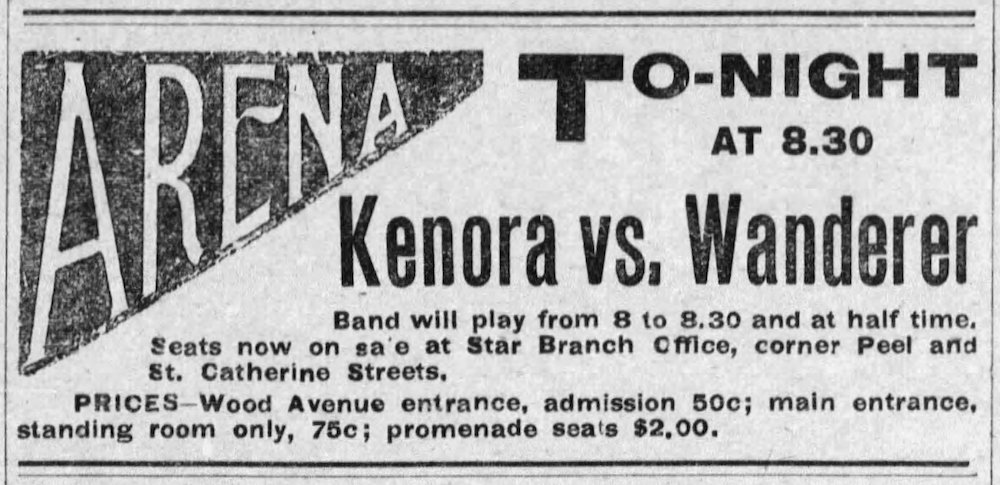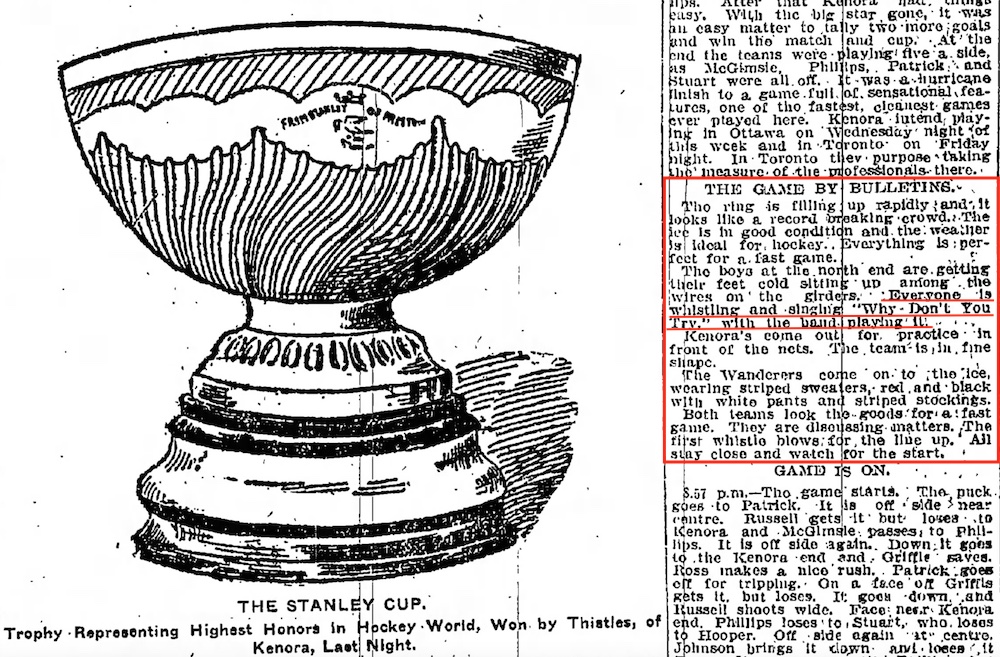I may have mentioned once or twice already that I have a new book about the Kenora Thistles coming out in November. It’s called Engraved in History and it’s being done by Brignall Media, a local Kenora publisher. (I also have Hockey Hall of Fame: True Stories coming out with Firefly Publishing this fall.) The Thistles won the Stanley Cup back in 1907, making Kenora the smallest town ever to win hockey’s top prize. It’s a good story…
I’ve never really been able to explain (to myself or to anyone else) why I find the years before and after the turn of the 20th century to be so fascinating. I’m pretty sure I wouldn’t really want to live there — “The past is a foreign country; they do things differently there” — but I do find so many of the stories to be fascinating!

There was no television or radio back in 1907, but fans could follow their favourite teams through many different newspapers. And when big games were played in distant cities, fans would gather (in rinks, or in theaters, in hotel ballrooms; even at the barber shop) to listen to telegraphed bulletins sent from rinkside to newspapers all across the country. The play-by-play in those bulletins could be remarkably similar to a radio or television broadcast today.
The Thistles won the Stanley Cup by defeating the Montreal Wanderers 8–6 on January 21, 1907, to sweep their best-of-three series. In reading reports of the game in newspapers on January 22, 1907, the Manitoba Free Press (which would become the Winnipeg Free Press in 1931) was among the many newspapers to run the copy of those play-by-play bulletins. In reporting on the crowd filling up the Montreal Arena prior to the game, the Free Press noted that “everyone is whistling and singing ‘Why Don’t You Try’ with the band playing it.”

I was, of course, intrigued!
Needless to say, when I was finished writing the book, I did some poking around.
Turns out that “Why Don’t You Try” was a popular song from a 1905 New York theater production called “The Belle of Avenue A” starring Elfie Fay.
Now, unless you’re an even bigger fan of early New York theater history than I am of early Canadian hockey history, you’ve probably never heard of Elfie Fay. But she was big in her day, if only for a little while.

Born on January 11, 1879, Elfie was the daughter of vaudeville star Hugh Fay of Barry and Fay. He was described as an Irish comedian. Elfie was a redhead with a habit of ad-libbing on stage and pulling faces. She sounds like an early incarnation of Lucille Ball or Carol Burnett, although her career never got very far. (She is described in the book American Musical Theater: A Chronicle by Gerald Bordman as “a promising Broadway belter who never fulfilled her promise.”)

If I’m putting this all together correctly, “The Belle of Avenue A” (which she herself was actually known as) was a show created for Elfie and built around a song of the same name that she had already made popular in an earlier Broadway show. In this one, Elfie played Maggie Burns, a poor girl temporarily on the bread line who agrees to pose as the wife of socialite George Fairfax, who must be married in order to collect his inheritance. Wackiness ensues, I would assume! (You can check out the lyrics of “Why Don’t You Try” if you’d like and you can listen to it too.)

Elfie seems to have been quite popular for a while, though apparently as much for her many engagements as anything else! (Including one in 1902 to Sir Thomas Lipton, of British tea and yachting fame, which she herself actually denied). Still, Elfie was once quoted as saying: “A woman can fall in love as often as she encounters a man who is able by superior qualities of heart and mind to inspire such love.”

New York Evening World, and New York Times from October 10, 1905.
But it seems that Elfie wasn’t actually very lucky in love. Married twice, the first ended in divorce after only three years. The second ended when her new husband died early in 1921 just three months after their wedding. Samuel Armstrong Benner is said to have been a wealthy steal executive, but Elfie inherited only $500 from his estate.
Later moving out to California with an actor-director brother named Hugh for their father, Elfie Fay appeared in a handful of movies between 1924 and 1927, but died of tuberculosis on September 16, 1927 at the age of only 48. (Not 46, as the clipping below says.) Her father Hugh had died at age 81 in 1925, while brother Hugh also died young in 1926. Elfie was still enough of a name at the time of her death that the Associated Press picked up on the story and reported it in newspapers across the United States.

What does any of this have to do with the Kenora Thistles or hockey?
Nothing at all. (Elfie’s story won’t appear in the book.) It’s just an example of why the stories from the early days can be so much fun to dig into … even if the music can be pretty awful!
Very interesting information about Elfie Fay. I must look her up in Google!!!
Why Don’t You Try. Hummmm… Hold my beer….
if anyone is interested in the lyrics for “Why Don’t You Try”
https://digitalcommons.conncoll.edu/sheetmusic/1731/
Same link (and a link to a digital recording) appears in the story … but worth repeating!
I got a kick out of the story and bigger kick out of Eric’s remarkable research.
Not to mention that I lived not far from Avenue A but never met a belle there.
(Avenue C, yes.) Also the sheet music “Why Don’t You Try” reminded me of my one and only boardwalk ride while doing a historic feature at Atlantic City. As Bob Hope and Shirley Ross would warble, “Thanks for the Memories.”
Many “actresses” we’re more famous for their “off stage” performances. Later it was “off screen” acts! So maybe Elfie was a hit because of her talents?
I had a cousin, part of a dance duo, who had a similar career. Married three times. First was her partner, then a Marquis, then a doctor (he lived in Detroit, she in New York, yet they managed to have a child!). Was in a few films where the dance number could be cut to shorten the movie if it was second half of a double bill. Rumoured to have been a “special friend” of Fred Astaire.
No idea if Ella ever watched hockey.
Fun story. Maybe they could make a musical of her life. Too bad Barbra is too old to play the lead.
Enjoyed this.
An interesting sidebar!
Delightful!
“Nor does Sue, think of you” from ‘the lyrics’,
…and, “Nothing at all.” – E. Zweig
;- )
Can’t wait to read both books. Congratulations, again, Eric